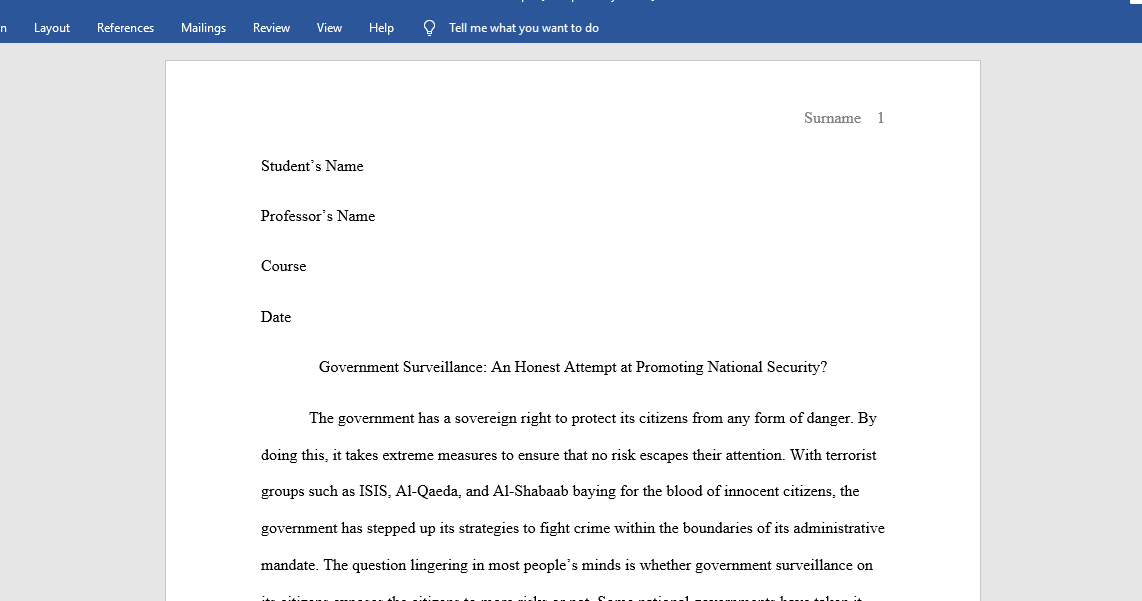Is Government Surveillance an Honest Attempt at Promoting National Security?
Is Government Surveillance an Honest Attempt at Promoting National Security? For your third revised essay, you will write a researched argument on an issue of interest to you. Your argument should be based on research and cite at least three different credible scholarly sources, using MLA or APA style (but not both). I suggest you use the style you think you will need for future courses to get practice. The topic is up to you, but it must be an arguable and “debatable” position. You should arrive at an “inquiry question” similar to the ones circled in the list below:
For the question of value, you cannot write another public “review” essay, but you can argue the worth/efficacy/legitimacy of something to a more academic audience. If you want to answer a “Policy Question” in a “problem-solution” type of an essay you can, but you should read Chapter 6 first. If you have difficulty finding a topic, try using the CQ Researcher database, which is accessible via Pipeline in the HPU Libraries> Databases. Another resource I like is the “Room for Debate” blog of the NYTimes.com. Here they have an archive of “hot” topics related to current events with essays presenting various positions. You should use the E3 Topic Discussion to “spitball” ideas, but email me directly if you still need additional ideas.
II. Research and Refine the Topic
With the help of the Library Tutorials and a special guest Research Librarian, you should use the e-Research Task to begin finding scholarly source materials and refining your topic and inquiry. You should also use more general resources to build your general “working” knowledge on the subject in general. You might use standard Internet searches, even Wikipedia for info-gathering background knowledge”, but note that these types of sites are not what you want to include in your bibliography. You should compile a “working bibliography” for your Research Proposal,
which is due by Monday of Week 6. (See pages 362-364 for an explanation and example.)
III. Process Suggestion:
As usual, begin with a sketch or “SFD.” (My review of student process journals has indicated that those who used this method are producing superior work in LESS time than classmates who are trying to “get it right the first time.”) Do not wait until the last minute to begin writing; that is where disaster lies. Aim to have produced the SFD by early Week 6, so that you can “craft it after you draft it.” As always, a “working draft” looks like a final paper, properly formatted (including page numbers) and using formal college-level English—but you will revise it again, and perhaps again and again. Also, keep in mind this is not for a “Public” audience. Your tone and word choice should be directed towards a more academic audience.
Content Advice: Remember the three basic ways you can use your sources—to provide background evidence, to provide support for your own argument, and to provide a viewpoint that you can argue against. (Often, this is the most fun—to find someone you disagree with and take them to task. Just be sure you do so without resorting to logical fallacies!) Review the textbook chapters on using evidence effectively and appealing to your more academic audience (relying more on logos and ethos).
Your essay should be structured in a conventional logical manner as a thesis-driven argument. It should have an introduction with a “lead-in” that arrives at a clear, complete (yet concise) thesis that includes your position (main claim) and a list of the reasons the essay will present in justifying your position (sub claims). You should have a body section comprised of paragraphs that provide your justifications for your stance, as well as a paragraph or two that acknowledge and rebut obvious counter arguments (naysayers). Finally, you should round off the essay with a conclusion that summarizes your argument and has a thoughtful endnote (e.g. suggestions/implications, predictions, new questions/areas for research, etc.).
Remember to address potential counter-arguments, bearing in mind that your thesis will be more defensible and complex if you find ways to incorporate good points from across the spectrum rather than making a one-sided argument.
Begin with a clear sense not just of your topic but of your specific research question(s), bearing in mind that the answer(s) you provide will form your thesis—which should be both supportable with reliable evidence, and debatable.
General Rules: Working drafts should be double-spaced, with 1” margins all around and use a standard font. Any ideas provided by others must be properly cited using consistent MLA or APA style (not a combination).
Banned topics: Abortion, capital punishment, legalization of pot or prostitution, any argument that is based on religious doctrine (you can’t impose your faith on others or convince others that their faith is invalid), and anything else I find hackneyed.
Answer preview:
Words:1541

